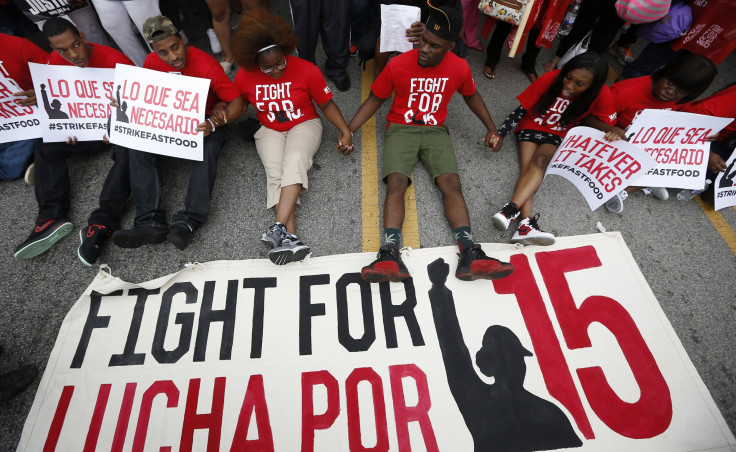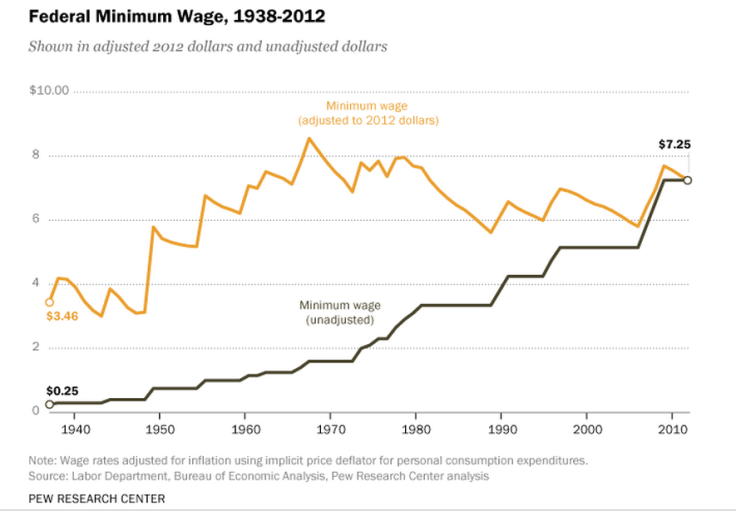20 States To Increase Minimum Wage In 2015, But Economic Impact Will Take Time

Millions of workers around the country will be getting a raise in 2015 after lawmakers in 20 states approved minimum wage hikes. These range from a 12-cent increase in Florida, bringing its wage to $8.05, to a $1.25 spike in South Dakota, lifting that state's minimum to $8.50. Collectively, the increases will account for a $1.6 billion increase in worker wages around the country, according to the Economic Policy Institute, a left-leaning think tank based in Washington, D.C.
While the move is a boon for millions of low-wage retail and fast-food workers who have been protesting low pay for two years, experts say the American minimum wage still has a long way to go to make an economic impact, and recent increases aren’t likely to have an immediate impact on the country’s economy. According to one study, if the federal minimum wage had kept pace with worker productivity over the last four decades, it would have hit $21.72 per hour by 2012.

“Obviously for workers it’s a good thing; they’ll have more money in their pockets,” Peter Cardillo, chief economist at Rockwell Global Capital, said. “But this has been long overdue. We’re not talking about a substantial increase.”
Some of the lowest-paid jobs in the country are in sectors such as retail sales and food preparation, and feature median wages as low as $8.81 an hour. Though this is slightly above the federal minimum wage of $7.25, it's nowhere near the $15 hourly target requested by protest movements such as “Fight for 15.”
Advocates for minimum wage increases have long cited the fact that the American minimum wage has not kept up with inflation in recent decades.

In 1938, the minimum hourly wage was set at 25 cents and has been raised 22 times, hitting $7.25 in July 2009. But these increases haven’t kept up with economic growth. Further, the “real value,” or purchasing power, of the minimum wage has actually decreased substantially over time.
Since 2009 it has lost 5.8 percent of its purchasing power compared to inflation, according to the PEW Research Center.
“As the legislated adjustments to the minimum wage standard have occurred at irregular intervals -- sometimes increasing annually, other times not for several years -- while prices have generally risen each year, the purchasing power of the minimum wage has varied considerably since its enactment,” reads a 2014 Congressional Research Service report.
At the same time, many of America's jobs have changed from high-paying to low-paying sectors.
“As the U.S. economy has shifted away from being an economy led by manufacturing to one increasingly reliant on services, lower wage paying jobs have come to dominate the labor market,” wrote Morgan Stanley economists Ellen Zentner and Paula Campbell in a September research note. “The result is a consistent slowdown in inflation-adjusted wage growth since the 1940s.”
But the recent attention on this issue is spurring legislation around the country, with Arizona, Colorado, Florida, Missouri, Montana, New Jersey, Ohio, Oregon and Washington tying their wage hikes to inflation, so wages will rise with consumer prices, and of the 11 states that passed laws in 2014, five have included similar indexing measures.
“It is common sense economics,” Rich Trumka, ALF-CIO president, said in a Wednesday statement. “Consumer spending accounts for 70 percent of the U.S. economy, and as workers’ wages increase, their spending increases, too, lending support to our communities and local economies.”
Democratic lawmakers are pushing for legislation that will raise the federal rate to $10.10 an hour and tie it to the consumer price index.
More dramatic changes are being made at the city level, with some localities raising rates above the federal minimum. San Francisco and Seattle both approved a gradual increase in rates to $15 per hour, while Chicago approved a boost to $13 by 2019. Los Angeles Mayor Eric Garcetti recently proposed a hike to $13.25 by 2017, while officials in Washington, D.C., voted to raise the minimum hourly wage from $8.25 to $11.50.
“We’ll continue to see more action at the state level and at the local level,” Ken Jacobs, chairman of the Center for Labor Research and Education at the University of California at Berkeley, told Bloomberg. “It is a very politically popular measure and so we would expect in 2016 that we should see more minimum-wage ballot initiatives.”
© Copyright IBTimes 2024. All rights reserved.






















